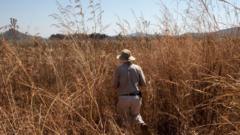In a significant development, Zimbabwe's government has initiated compensation payments amounting to US$3 million to white farmers whose lands were seized during a controversial land reform program in the early 2000s.
Zimbabwe Begins Long-Awaited Compensation Payments to White Farmers

Zimbabwe Begins Long-Awaited Compensation Payments to White Farmers
Historic payments follow a 2020 agreement aimed at addressing past injustices and mending international ties.
The payments, announced Wednesday, are the first under a 2020 agreement between the government and former landowners, under which Zimbabwe committed to compensating a total of $3.5 billion for seized farmland. This move is part of an effort to redress the loss of property endured by thousands of farmers during a period of aggressive land seizures initiated between 2000 and 2001. The original intention behind these seizures was to address colonial-era injustices, but they contributed significantly to the nation's economic downturn and soured its relationships with Western nations.
The initial payment will cover 378 farms from a total of 740 approved for compensation, representing just 1% of the $311 million allocated for this first payment phase. Zimbabwe's Finance Minister, Mthuli Ncube, stated that the remaining payments will be issued through US dollar-denominated Treasury bonds. "Compensating former farm owners who lost their farms during the land reform program is one of our commitments as we seek to reform the Zimbabwean economy," he said.
Harry Orphanides, a representative for the farmers, noted an uptick in interest from other farmers eager to participate in the compensation process. However, most former farmers have yet to accept the deal, with many still holding onto their title deeds. The Zimbabwean government has clarified that it will only compensate for "improvements" made on the land and has declined to pay for the land itself, contending that it was unjustly appropriated by colonial powers.
Earlier this year, Zimbabwe commenced compensation payments to foreign investors whose farms had protections under bilateral investment agreements. Since gaining independence in 1980, Zimbabwe has structured its land reform efforts to redistribute white-owned land to black farmers, correcting historical injustices from colonial rule.
The land seizures, supported by former President Robert Mugabe, prompted widespread international condemnation and have been a significant barrier to Zimbabwe's economic recovery. Current President Emmerson Mnangagwa, who succeeded Mugabe in a 2017 coup, is now striving to rebuild relations with Western governments. He has acknowledged that while land reform cannot be reversed, compensating former landowners is crucial for re-establishing international ties.
Economic analysts view this compensation initiative as a pivotal stride towards mending relations with Western nations and evading further international judgments against Zimbabwe, which has struggled with a crippling foreign debt and has been isolated from the global financial system for over two decades.
The initial payment will cover 378 farms from a total of 740 approved for compensation, representing just 1% of the $311 million allocated for this first payment phase. Zimbabwe's Finance Minister, Mthuli Ncube, stated that the remaining payments will be issued through US dollar-denominated Treasury bonds. "Compensating former farm owners who lost their farms during the land reform program is one of our commitments as we seek to reform the Zimbabwean economy," he said.
Harry Orphanides, a representative for the farmers, noted an uptick in interest from other farmers eager to participate in the compensation process. However, most former farmers have yet to accept the deal, with many still holding onto their title deeds. The Zimbabwean government has clarified that it will only compensate for "improvements" made on the land and has declined to pay for the land itself, contending that it was unjustly appropriated by colonial powers.
Earlier this year, Zimbabwe commenced compensation payments to foreign investors whose farms had protections under bilateral investment agreements. Since gaining independence in 1980, Zimbabwe has structured its land reform efforts to redistribute white-owned land to black farmers, correcting historical injustices from colonial rule.
The land seizures, supported by former President Robert Mugabe, prompted widespread international condemnation and have been a significant barrier to Zimbabwe's economic recovery. Current President Emmerson Mnangagwa, who succeeded Mugabe in a 2017 coup, is now striving to rebuild relations with Western governments. He has acknowledged that while land reform cannot be reversed, compensating former landowners is crucial for re-establishing international ties.
Economic analysts view this compensation initiative as a pivotal stride towards mending relations with Western nations and evading further international judgments against Zimbabwe, which has struggled with a crippling foreign debt and has been isolated from the global financial system for over two decades.


















